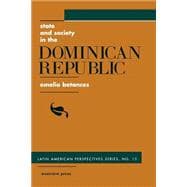
Note: Supplemental materials are not guaranteed with Rental or Used book purchases.
Purchase Benefits
What is included with this book?
| Foreword | p. xiii |
| Acknowledgments | p. xvii |
| Introduction Historical And Theoretical Perspectives | p. 1 |
| Nineteenth-Century Regionalism Political Struggle, And State Formation | p. 9 |
| Capitalist Agriculture And Class-State Formation at The Turn of the Century | p. 23 |
| Merchants and the Integration Of the State into The International Credit System | p. 41 |
| The Beginnings of The Modern Dominican State | p. 57 |
| State Formation and The U.S. Military Occupation | p. 77 |
| Class and State Formation Under Trujillo | p. 95 |
| Consolidation of the Modern State, Class Formation, And Capitalist Restructuring | p. 113 |
| State and Class Formation In the Dominican Republic Some Conclusions | p. 135 |
| Bibliograpby | p. 141 |
| About the Book And Author | p. 151 |
| Index | p. 153 |
| Table of Contents provided by Publisher. All Rights Reserved. |
The New copy of this book will include any supplemental materials advertised. Please check the title of the book to determine if it should include any access cards, study guides, lab manuals, CDs, etc.
The Used, Rental and eBook copies of this book are not guaranteed to include any supplemental materials. Typically, only the book itself is included. This is true even if the title states it includes any access cards, study guides, lab manuals, CDs, etc.